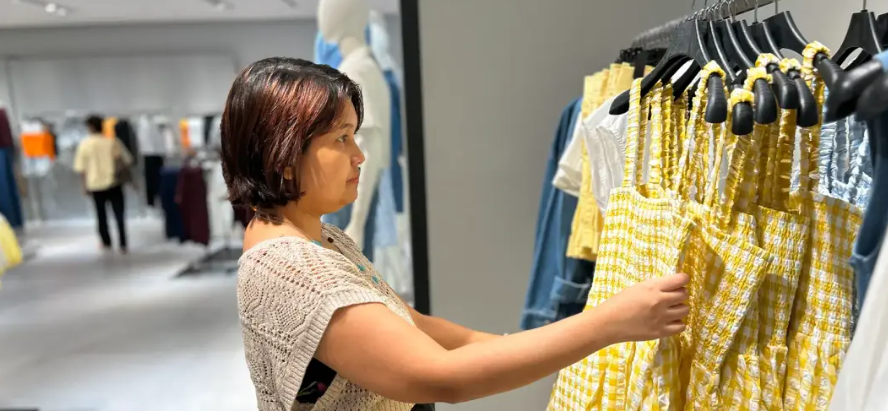
Me wearing a Country Road dress that I’ve owned for many, many years – and not afraid to wear more than once, for multiple social media postings! Country Road is part of Woolworths Holdings Limited (WHL) South Africa, who has been on their Good Business Journey since 2007.
Before #organic food became a trend, did you ever think about chemicals in your veggies? Before eggs were labelled “cage-free”, did anyone wonder about the well-being of the hens? Before cars had fuel-efficiency stickers and carbon emissions information on their windscreens at the dealership, did you consider these as a purchasing factor? Before we had fluorescent lightbulbs, did you understand the relationship between wattage and power consumption?
The point I’m trying to make is, the industry – or let’s just call it, the #apparel or #clothing industry, has been slow to catch up with the realities of the world. We live in the 21st century now. We are proud to announce the origins of the wood in our furniture, our whitegoods and electronic goods come with energy or water consumption labelling, and we know halogen lights suck power like there’s no tomorrow (you can switch them for LED ones that maintain the aesthetics – way more efficient.)
Today, when we buy a piece of clothing, there is no label that says exactly what raw materials, resources, and labour had gone into making it. I reckon it’s about time they exist.
Valentino and Karl (Lagerfeld)
In 2010, I stumbled upon the documentary
Valentino: The Last Emperor. I remembered the fashion house designer was stressed about his latest collection, one of his last before he retires. We see him hurrying his seamstresses to meet deadlines for this very important fashion show to commemorate his 45th anniversary in fashion
. I remember thinking, what will happen to all the beautiful fresh flowers and decorations adorning the event venue? What shocked me the most was the fact that Valentino would jet-set from one fashion show to another, bringing the same dresses on his private plane.
Today, when we buy a piece of clothing, there is no label that says exactly what raw materials, resources, and labour had gone into making it. I reckon it’s about time they exist.
It opened my eyes to how wasteful this industry is. The clothes themselves are painstakingly made once, for the runway, and this in itself was not excessive. (Even if you might argue it’s incredibly pedantic.) The process valued the artisans, the heritage, the skills that came with sewing, stitching and beading and the way the fabrics fell on the floor. But the glitz and glamour and the excess of the shows themselves were not cool. I even remembered how the guests received a goodie bag each filled with expensive items. My head was sore from shaking so much! But why? These people are rich, and they can afford to buy their own nice things! My brain started to wander.

The True Cost (2015) is a documentary about the clothes we wear, the people who made them, and the impacts it’s having on our world.
I Woke Up
In May 2011, one of my closest friends, Rebecca Jean Wright, died from a horrific car accident. I saw her three days prior to her death, and wrote to her just the night before. (She died on a Wednesday morning on the way to work.) In February 2012, I moved to Perth from Melbourne, with my then boyfriend, seeking a new life. In 2013, something big was brewing inside of me. I was unhappy in my relationship and my job. In April, the Rana Plaza Collapse happened. I’m sure there were other disasters that commanded the news that year, but for me, this was big, and it was heartbreaking.
On Valentine’s Day 2014, I told my boyfriend I wanted to end our relationship. We were discussing options of relocating to the UK, because he had been made redundant in his job. This was the opportunity to do something with my life, I thought. So, I went crazy on Twitter and started checking out the scene.
I spammed a few Twitter profiles I found, and guess what? One of them, Lucy Siegle, asked me to email her. This is what I wrote:



The crazier thing was, Lucy wrote back! But there was more – she had actually wrote a book about all the things that was bothering me about fashion, no joke! It’s called “To Die For – Is Fashion Wearing Out the World?”, published in 2011.
I won’t go into the details of it, but in 2016, Deconstructing My Wardrobe was born.
Suffice to say, I did not move to the UK, nor did my boyfriend and I ended up staying together. But the passion for something else – solving problems in fashion – was definitely burning bright.

#FashRev Manifesto, launched 23 April 2018
Frustration starts things
I started Deconstructing My Wardrobe because I got frustrated with the lack of information I was going to get when shopping for clothes. (Yeah, you heard me right. I anticipated this every time I entered a shopping centre. I even stopped window shopping. I knew I was not going to get what I wanted once I walked into a store and flicked through the item that caught my eye, after having looked at its price and material.) I got frustrated that I had to do all the work. I was frustrated some of the so-called ‘ethical’ or ‘sustainable’ fashion brands from overseas would cost me an arm and a leg when you take into account the exorbitant shipping costs to Australia.
The reason I am championing for environmental footprinting affixed to your item of clothing is because
– it will help me make the right decisions for myself. Just as it helps me when I pick up my eggs at the market, purchasing a washing machine, choosing the right yoghurt, and investing in a car.
I don’t have time to curate my wardrobe. Some people do, hats off to you. Some brands don’t have the styles that suit me. Some brands that I might have an affinity towards, don’t have a store near me so I can try their clothes on for size. I don’t have the friggin’ time to do a lot of things, nowadays. We’re all busy people, right?
I believe that when the information is presented to us, we will take notice. Just as we took notice of our eggs, the ingredients in our food, and how we can save energy when we know what wattage meant.
Style and personal taste. Ethics and personal values. These all vary so much from one individual to another and are highly ingrained. When you present us with information at point of purchase, we can make our own decisions, thankyouverymuch.
The reason I am championing for environmental footprinting affixed to your item of clothing is because – it will help me make the right decisions for myself.
Manifesto
Today, 23 April, is the start of Fashion Revolution Week. All across the world, in more than 100 countries, #fashion lovers will be asking their favourite brands ‘Who Made My Clothes?’ on social media, and taking part in some of the many talks, film screenings, and clothes swaps there are to choose from in their respective cities.
Fashion Revolution has also today launched their manifesto – you can read it on their website.
This year is exactly five years since the devastating Rana Plaza disaster. Many of us will be looking back at how far our movement has come, and the real change that’s starting to happen in the industry. I, for one, am a less frustrated person. I have many options in terms of new clothes, if I needed to buy any. (I haven’t bought new clothes since November 2016.) I’m discovering new ethical and sustainable brands, everyday. They disclose information about their products. We still don’t have legislation that puts a minimum requirement on mandatory environmental labelling, but #FashRev has kept pressure on the fashion industry. It will keep doing more. We will always demand, ‘Who Made My Clothes?’ I will still be here, fighting, and taking action.
Transparency can’t come soon enough.

Kuala Lumpur happenings
I’m excited to watch a screening of RiverBlue on Saturday, 28 April, hosted by Fashion Revolution Malaysia and take part in conversations with lots of people throughout the week.
Check out my Instagram Highlights at @fashinfidelity to see my outfits throughout the month, as part of my campaign, Say Yes to Wearing It Twice! to support #FashRev. It’s not too late to take part, too 😉
Join us in our Slow Fashion movement with the hashtag #ConscientiousFashionista and #wardrobetruths on Instagram, and follow us at @fashinfidelity.
Tags:
#fashrev #fashionrevolution #haulternative #conscientiousfashionista #fastfashion #slowfashion #ethicalfashion #ecofashion #sustainablefashion #greenfashion #sustainability #wardrobetruths #fashioneducation #fashionisnolongertrendy #fashion #wardrobetruths #saynotofastfashion #kualalumpur




